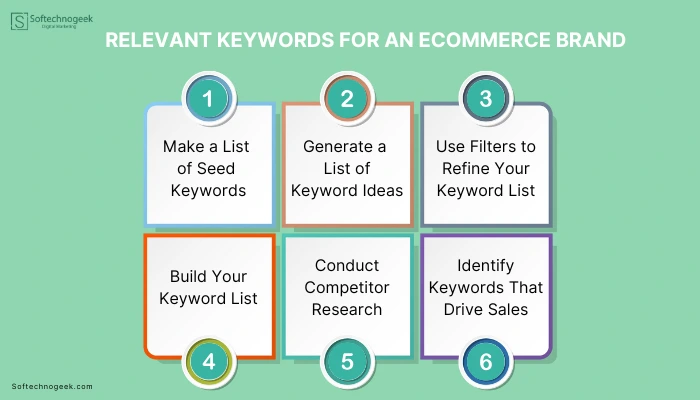Learn the importance of ecommerce keyword research and how it can boost your online store’s visibility and sales. This guide covers everything from finding relevant keywords to optimizing your site and tracking performance.
What Is Ecommerce Keyword Research?
Ecommerce keyword research involves identifying and analyzing relevant search terms for online stores.
You can use these keywords to create or update product pages to rank in search engine results. This approach helps attract people searching for specific products, increasing the chances of converting them into customers.
Why Ecommerce Keyword Research Matters
Ecommerce keyword research enables product pages to appear prominently in search engines, boosting organic traffic and ultimately driving more sales.
It also helps you:

- Stay ahead of competitors: Identify keywords your competitors haven’t targeted and capture untapped market opportunities.
- Improve market share: Find keywords your competitors rank for and use them to capture their traffic.
- Optimize advertising spend: Discover low-competition keywords for cost-effective search ads.
- Enhance user experience: Analyze search intent behind keywords and align your content to meet user needs, ensuring a positive site experience.
What to Look for in Ecommerce Keywords
When performing ecommerce keyword research, focus on keywords with these attributes:
- Commercial or transactional intent: Keywords that connect you to buyers ready to make a purchase.
- Specificity: Long-tail keywords, like “grain-free dog treats,” attract niche buyers looking for specific products.
- Feasibility: Target keywords with manageable competition (low to moderate keyword difficulty) and reasonable search volume.
- Commercial relevance: Ensure the keywords match your products. For example, “organic dog treats” is relevant if you sell them, but “dog grooming tips” may not drive sales.
Additionally, incorporate branded keywords (e.g., “ Riley’s organic dog treats ”) to capture interest from customers familiar with your brand.
How to Find out the Relevant Keywords for an Ecommerce Brand

1. Make a List of Seed Keywords
Seed keywords are broad, foundational terms that describe your business or products. They serve as the starting point for keyword research.
For example, if you sell yoga gear, seed keywords like “yoga mat,” “yoga equipment,” and “yoga accessories” describe your offerings.
2. Generate a List of Keyword Ideas
Input your seed keywords into a keyword tool to discover related terms and relevant metrics.
- Use Google’s Keyword Planner to get search volume, competition level, and ad impression data.
- Use Semrush’s Keyword Magic Tool for a comprehensive keyword list with search volumes and competition scores.
Focus on key columns:
- Intent: Understand the searcher’s purpose (e.g., informational or transactional).
- Volume: Estimate the keyword’s monthly searches.
- PKD %: Assess keyword difficulty for ranking on the first search results page.
3. Use Filters to Refine Your Keyword List
Filter Keywords by Relevance
Remove irrelevant keywords. For instance, if you don’t sell a specific yoga mat brand, exclude it.
Filter Keywords by Difficulty
Focus on low-difficulty keywords (PKD % under 50%) to improve ranking chances, especially for new websites.
Filter Keywords by Search Intent
Prioritize commercial and transactional intent keywords to attract customers ready to purchase.
Filter Keywords by Search Volume
Select keywords with sufficient search volume to align with your traffic goals.
4. Build Your Keyword List
Narrow your filtered keywords into a refined list by selecting the most relevant terms.
5. Conduct Competitor Research
Use the Keyword Gap Tool to identify keywords competitors rank for that you don’t. Apply filters for commercial and transactional intent keywords to focus on high-conversion opportunities.
6. Identify Keywords That Drive Sales
Analyze clickstream and conversion data to estimate a keyword’s revenue potential. Multiply traffic potential with conversion rates to prioritize keywords that drive sales.
Optimize Your Site with Ecommerce Keywords
Place keywords strategically across key areas of your website:
- Product titles, descriptions, and specifications
- Category names and descriptions
- Clean, descriptive URLs
- H1 tags and subheadings
- Title tags and meta descriptions
- Image file names and alt text
- Blog posts or buying guides
- Navigation menus and internal links
Pro Tip: Use the SEO Writing Assistant to optimize long-form content for readability, keyword inclusion, and tone.
Track and Adjust Your Keyword Strategy
Monitor keyword performance using tools like Google Search Console and Position Tracking.
- Identify high-performing keywords.
- Optimize low-ranking pages to improve visibility.
Give new pages time to settle before adjusting your strategy. Fine-tune your content to align with changing trends and keep improving your rankings.
Frequently Asked Questions
Q1. What is ecommerce keyword research, and why is it important?
Ecommerce keyword research involves identifying and analyzing search terms to optimize product pages for search engines. It’s crucial for attracting relevant traffic, staying ahead of competitors, and driving sales.
Q2. What attributes should I look for in ecommerce keywords?
Focus on keywords with commercial intent, specificity, manageable competition, and commercial relevance to ensure they drive traffic and conversions.
Q3. How can I find relevant keywords for my ecommerce store?
Start with seed keywords, use tools like Google’s Keyword Planner or Semrush to generate ideas, filter by relevance and difficulty, and analyze competitor data to refine your list.
Q4. Where should I use ecommerce keywords on my website?
Incorporate keywords in product titles, descriptions, specifications, category names, URLs, H1 tags, meta descriptions, image alt text, and blog content for maximum impact.
Q5. How can I track the success of my keyword strategy?
Use tools like Google Search Console and Position Tracking to monitor performance, identify opportunities for improvement, and adjust your strategy to align with evolving trends.
Conclusion
Ecommerce keyword research is the foundation of a successful SEO strategy. By identifying the right keywords, optimizing your site, and tracking your efforts, you can drive more organic traffic, enhance the shopping experience, and increase sales. Start implementing these practices today to stay ahead in the competitive ecommerce market.
Ready to enhance your ecommerce SEO? Contact Softechnogeek for more details.





